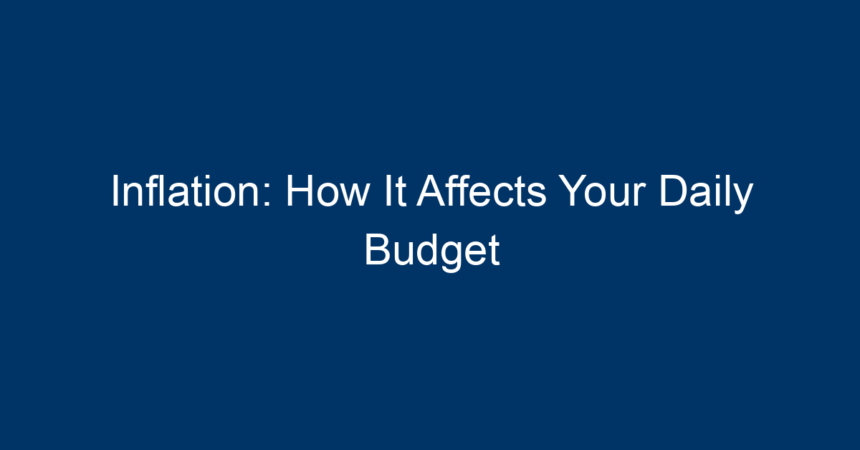In recent years, the concept of inflation has dominated headlines and conversations, influencing the financial decisions of individuals and families alike. Whether you’re at the grocery store, filling up your gas tank, or making plans for the holidays, the rising costs associated with inflation can impact your daily budget in significant ways. Understanding inflation and its ramifications is crucial for effective financial planning. This article delves into what inflation is, how it affects your daily budget, and what you can do to mitigate its effects.
What is Inflation?
Inflation, by definition, is the rate at which the general level of prices for goods and services rises, eroding purchasing power. It is typically measured by the Consumer Price Index (CPI) or the Producer Price Index (PPI). When inflation rises, you find that your money doesn’t stretch as far as it used to. A dollar buys fewer goods and services than before, which complicates budgeting and financial planning.
Types of Inflation
-
Demand-Pull Inflation: This occurs when demand for goods and services exceeds supply. In a growing economy, consumers tend to spend more, leading to increased prices.
-
Cost-Push Inflation: This type happens when the costs to produce goods and services rise, forcing businesses to increase their prices to maintain profit margins.
- Built-In Inflation: Often referred to as wage inflation, this occurs when businesses raise wages to attract workers. Increased wages can lead to higher costs for employers, which they may pass on to consumers through higher prices.
Understanding these types can provide insight into the varying pressures that affect your daily expenses.
The Impact of Inflation on Your Monthly Budget
Inflation affects nearly every aspect of daily life, but here are some of the most significant areas where you might feel its effects most acutely:
Rising Grocery Costs
The grocery store is often the first place consumers notice the effects of inflation. Increased prices for essential items like bread, milk, and meat can be alarming. As production costs rise—due to labor expenses, shipping, and raw materials—these costs are passed on to you.
Tips to Mitigate Grocery Costs:
- Plan Your Meals: Create a shopping list to avoid impulse purchases.
- Buy in Bulk: Take advantage of bulk-buy discounts for non-perishable items.
- Stick to Seasonal Produce: Seasonal fruits and vegetables are usually cheaper and fresher.
Fuel Prices
Gasoline prices are notoriously volatile and often spike during inflationary periods. Higher fuel costs can lead to increased prices for everything from groceries to home goods, as transportation costs rise.
Fuel-Saving Strategies:
- Carpool or Use Public Transport: Reduce the number of trips you take.
- Optimize Driving Habits: Smooth driving reduces fuel consumption.
- Consider a More Fuel-Efficient Vehicle: If feasible, this can be a long-term cost saver.
Housing Costs
Whether you rent or own, housing is typically the biggest monthly expense for consumers. Inflation can affect property prices and rents, making housing less affordable for many.
Housing Budgeting Tips:
- Reassess Your Living Situation: Consider downsizing or relocating to a more affordable area.
- Negotiate Rent: If you’re renting, ask your landlord if there’s room for negotiation, especially if you’ve been a good tenant.
Healthcare Expenses
Healthcare costs are another area where you might feel the pinch of inflation. Medical services can become more expensive, and out-of-pocket costs may increase, impacting your budget.
Ways to Manage Health Expenses:
- Use Preventive Care: Regular check-ups can catch issues early and save you money later.
- Shop for Medications: Compare prices at various pharmacies.
Inflation and Savings
While inflation can erode the purchasing power of your money, it also impacts savings. Keeping money in a low-interest savings account might not suffice to keep pace with inflation, leading to a net loss in purchasing power over time.
Improving Your Savings Strategy
- High-Interest Accounts: Look for high-yield savings accounts that provide better interest.
- Diversify Investments: Consider stocks, bonds, or mutual funds, which may offer higher returns over the long term.
- Invest in Inflation-Protected Securities: These are designed to give you some level of protection against inflation.
Long-Term Implications of Inflation
Inflation isn’t just a short-term concern; it can have lasting effects on your financial future. As prices rise, your retirement savings may need to keep pace to ensure a comfortable retirement.
Retirement Planning with Inflation in Mind
- Adjust Retirement Projections: Factor in a reasonable inflation rate to understand how much you’ll need to save.
- Invest in Inflation-Linked Funds: These can be vital as they adjust with inflation, preserving your purchasing power.
Conclusion: Taking Control of Your Budget
Understanding inflation is key to managing your daily budget effectively. While you can’t control inflation rates, you can take proactive steps to mitigate their impact on your finances. From altering spending habits to seeking better savings options, empowerment lies within strategic financial planning.
Actionable Insights:
- Budget Wisely: Review your budget regularly and adjust for expected price increases.
- Stay Informed: Educate yourself about economic indicators that might signal rising inflation.
- Emergency Fund: Maintain a solid emergency fund to cushion against unforeseen price jumps.
By being aware of the effects of inflation and applying practical strategies, you can better navigate the financial landscape, ensuring a stable budget even amidst rising prices.
With the right approach, you can make informed choices that safeguard your financial future against the unseen pressures of inflation.



